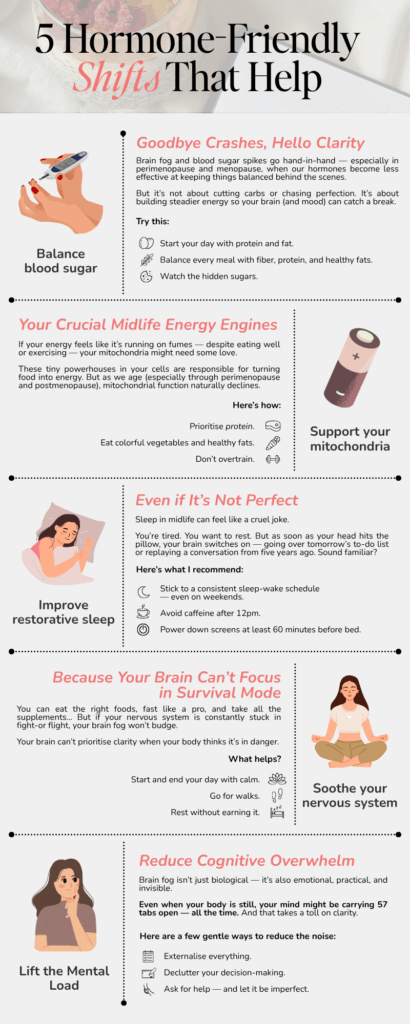
You’re not going mad — it’s your hormones (and you’re not alone)
There was a time when I couldn’t remember what I walked into a room for.
Or where I’d put my keys.
Or the name of that author I’d been talking about just ten minutes ago.
It wasn’t just the forgetfulness — it was the fuzziness. The feeling of being in a mental fog. Like I was walking through life with a woolly hat pulled over my brain.
“You’re not broken. You’re not losing it. And no, it’s not just ageing.”
Brain fog is one of the most common — and least talked about — symptoms of perimenopause and postmenopause. It affects up to 80% of women in midlife, and it can be deeply frustrating, especially when you’re trying to hold your life together as a mother, partner, professional, and everything in between.
But here’s the truth I wish I’d heard sooner:
You can shift this.
Not with hacks or hustle — but with small, supportive tweaks that help you feel clearer, steadier, and more like yourself again.
Today, I want to walk you through five gentle but powerful changes that helped me regain my clarity — and that I now share with my clients navigating brain fog in midlife. These are simple, realistic shifts that work with your hormones, not against them.
Quick Look: 5 Hormone-Friendly Shifts That Help
- Balance blood sugar
- Support your mitochondria
- Improve restorative sleep
- Soothe your nervous system
- Reduce cognitive overload

Let’s start with what’s actually happening in your brain…
During perimenopause and postmenopause, hormonal shifts — especially the decline in estrogen and progesterone — can cause a cascade of changes in how your brain functions. Estrogen, in particular, plays a key role in regulating glucose metabolism, supporting mitochondrial health, and maintaining neurotransmitters like serotonin, dopamine, and acetylcholine.
When these hormone levels fluctuate or drop, it can lead to:
- Impaired glucose processing — which means your brain isn’t getting the steady fuel it needs.
- Reduced mitochondrial function — so your cells produce less clean energy.
- Disrupted communication between brain cells — which can affect memory, mood, and clarity.
All of this contributes to the foggy, fuzzy, hard-to-focus feeling many women describe — even when they’re doing everything “right.”
That’s why brain fog isn’t solved with more coffee or a better planner.
It needs a whole-body, hormone-informed approach.
Here’s where I guide my clients to start:
1. Stabilize Blood Sugar (Goodbye Crashes, Hello Clarity)
Brain fog and blood sugar spikes go hand-in-hand — especially in perimenopause and menopause, when our hormones become less effective at keeping things balanced behind the scenes.
When your blood sugar swings up and down, it’s like trying to think clearly on a rollercoaster. One minute you’re wired, the next you’re wiped out. The result? Irritability, forgetfulness, poor focus — and the dreaded 3PM crash.
But it’s not about cutting carbs or chasing perfection. It’s about building steadier energy so your brain (and mood) can catch a break.

Try this:
- Start your day with protein and fat. Think eggs with avocado, or a protein smoothie with healthy fats like nut butter or chia seeds.
- Balance every meal with fiber, protein, and healthy fats. These slow the release of glucose into your bloodstream and help prevent energy dips.
- Watch the hidden sugars. Even healthy-looking snacks can send you on a blood sugar rollercoaster. If you’re grabbing something quick, pair it with protein to stay steady.
“Balancing my blood sugar was a game-changer. No more 3pm crashes, no more late-night cravings. Just calm, consistent energy — and a clearer mind.” — Samantha
Over time, these small shifts support better insulin sensitivity and help your brain feel calm, clear, and better nourished — without relying on caffeine or sugar for a boost.
2. Support Your Mitochondria (Your Crucial Midlife Energy Engines)
If your energy feels like it’s running on fumes — despite eating well or exercising — your mitochondria might need some love.
These tiny powerhouses in your cells are responsible for turning food into energy. But as we age (especially through perimenopause and postmenopause), mitochondrial function naturally declines. That means less fuel for your brain, muscles, and mood — and yes, more brain fog.
The good news? You can support them.

Here’s how:
- Prioritise protein. Amino acids help rebuild cells and support neurotransmitter production.
- Eat colourful vegetables and healthy fats. Think leafy greens, berries, avocado, olive oil — packed with antioxidants to reduce oxidative stress on cells.
- Don’t overtrain. High-intensity workouts every day can actually damage mitochondria. Instead, try strength training 2–3x/week and walks in fresh air.
- Incorporate fasting rhythms. Strategic fasting (like 16:8, or occasional 36-hour resets) can stimulate mitophagy (your body’s natural “cell clean-up” mode for damaged mitochondria) and give your body the rest it needs to repair.
- Hydrate with high-quality electrolytes. I personally use and recommend BEAM Minerals — their electrolytes and micronutrients are instantly absorbed into the body and mitochondria, making them incredibly effective for energy and clarity. Because I love them so much, I’ve partnered with BEAM to offer a 20% discount — but due to their policy, I can only share the link and code directly.
Want the discount? Just email me or send a quick DM and I’ll pass it along.
(Currently available in the US only — international shipping is available but limited.)
“Once I started supporting my mitochondria instead of just pushing through with caffeine or willpower, my energy came back — for real.” — Lisa
Midlife isn’t a decline. It’s a recalibration. Your body’s still working — it just needs more targeted support for the season you’re in.
3. Prioritize Restorative Sleep (Even if It’s Not Perfect)
Sleep in midlife can feel like a cruel joke.
You’re tired. You want to rest. But as soon as your head hits the pillow, your brain switches on — going over tomorrow’s to-do list or replaying a conversation from five years ago.
Sound familiar?
It’s not in your head. Declining progesterone and fluctuating cortisol can wreak havoc on sleep. Add in the responsibilities of parenting, caregiving, and working, and it’s no wonder so many women in perimenopause and beyond feel exhausted — but wired.
The goal isn’t perfection. It’s restorative sleep — the kind that helps your brain detox, your hormones regulate, and your nervous system calm down.

Sleep isn’t just for rest — it’s when your brain flushes out waste, consolidates memory, and balances mood.
Here’s what I recommend:
- Stick to a consistent sleep-wake schedule — even on weekends. If you go to bed later, try to still wake up around the same time to keep your circadian rhythm steady.
- Avoid caffeine after 12pm. Even if you don’t feel “wired,” caffeine can linger in your system and mess with your body’s ability to wind down.
- Power down screens at least 60 minutes before bed. Blue light and endless scrolling confuse your brain into thinking it’s still daytime.
- Have a magnesium-rich evening snack. A small handful of pumpkin seeds or a warm cup of almond milk with cinnamon can help calm the nervous system.
- Go to bed before you hit exhaustion. Think of it like surfing — catch the sleep wave when it’s rising, not crashing.
- Track your cycle and symptoms. Many women sleep better during certain phases. Once you know your patterns, you can work with your body instead of fighting it.
“I stopped chasing 8 perfect hours and focused on winding down. Even with broken sleep, I felt clearer the next day.” — Natalie
One good night of sleep won’t fix everything. But small, consistent changes to your evening rhythm can absolutely sharpen your mind, stabilise your mood, and reduce that heavy brain fog.
If you want to go deeper on sleep strategies, I break it all down in this post on foundational health habits.
4. Support Your Nervous System (Because Your Brain Can’t Focus in Survival Mode)
You can eat the right foods, fast like a pro, and take all the supplements…
But if your nervous system is constantly stuck in fight-or-flight, your brain fog won’t budge.
Midlife brings a lot — caregiving, career pressure, sleep disruption, hormonal shifts, emotional overwhelm. And all of it sends signals to your body that it’s not safe to slow down.
Your brain can’t prioritise clarity when your body thinks it’s in danger.

What helps?
- Start and end your day with calm. Five deep belly breaths. Two minutes of silence. A gentle stretch. These small moments regulate your system more than you realise.
- Go for walks. It’s not just for steps — walking is bilateral stimulation, which helps reset your nervous system and improve cognitive function.
- Rest without earning it. This one’s tough for many women. But choosing rest before burnout is one of the most powerful midlife skills you can build.
“When I finally stopped pushing through the fog and started actually resting, I got my clarity back — and my creativity.” — Natalie
This isn’t self-care fluff. It’s science-backed, hormone-friendly nervous system support — and it’s the missing piece for so many women.
5. Lift the Mental Load (Reduce Cognitive Overwhelm)
Brain fog isn’t just biological — it’s also emotional, practical, and invisible.
Most midlife women I work with are carrying a massive mental load:
- Managing work deadlines and dentist appointments

- Remembering birthdays, prescriptions, and which child likes what for lunch
- Emotionally supporting their families while keeping the fridge stocked and the Wi-Fi working
It’s not just multitasking. It’s mental juggling. Constantly. And it’s exhausting.
Even when your body is still, your mind might be carrying 57 tabs open — all the time.
And that takes a toll on clarity.
Here are a few gentle ways to reduce the noise:
- Externalise everything. Use a notes app, whiteboard, planner — anything that gets the to-dos out of your head and into a visible, manageable place. Free your brain from holding it all.
- Declutter your decision-making. Create weekly meal templates, rotate the same outfits, automate recurring tasks. The fewer decisions you have to make, the more energy you reclaim.
- Ask for help — and let it be imperfect. Whether it’s sharing school runs, handing over dinner duty, or asking a partner to take over emotional admin, don’t wait until you burn out to delegate. Reassign what you can, even if it’s not done your way.
The goal isn’t to do more.
It’s to do less — with more clarity, presence, and peace.
Reducing your mental load is one of the most underused, hormone-supportive brain fog remedies I know.
Which of these shifts feels most doable right now? Even one change can help your brain feel clearer and more supported.
You Don’t Have to Settle for “Scattered”
Brain fog isn’t just a nuisance — it’s a real signal from your body that something’s out of sync. And the good news? You can change it.
With the right support, the right rhythms, and a bit of space to listen in, clarity can return. Energy can rise. You can feel like yourself again.
If you’ve been putting off your own wellness while showing up for everyone else — this is your sign to shift that.
You don’t need to go it alone.

Ready to clear the fog and feel sharper, calmer, and more energised in midlife?
Book your free 30-minute Insight Call with me — I’ll help you figure out whether hormone-safe fasting, nervous system support, or lifestyle rhythms are the right next step for your body.
It’s free, there’s no pressure — just clarity on your next best step.













+ Show / Hide Comments
Share to: